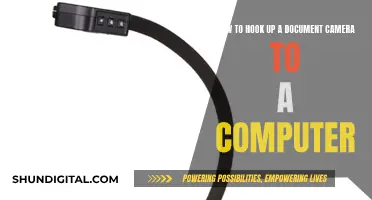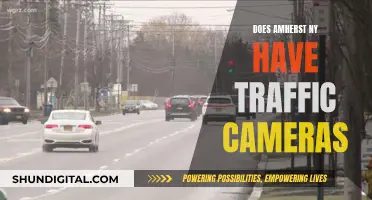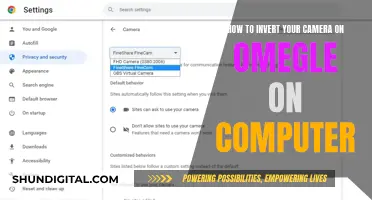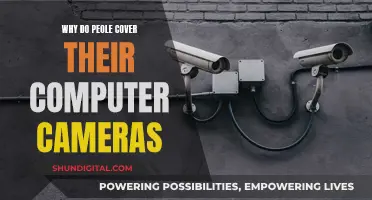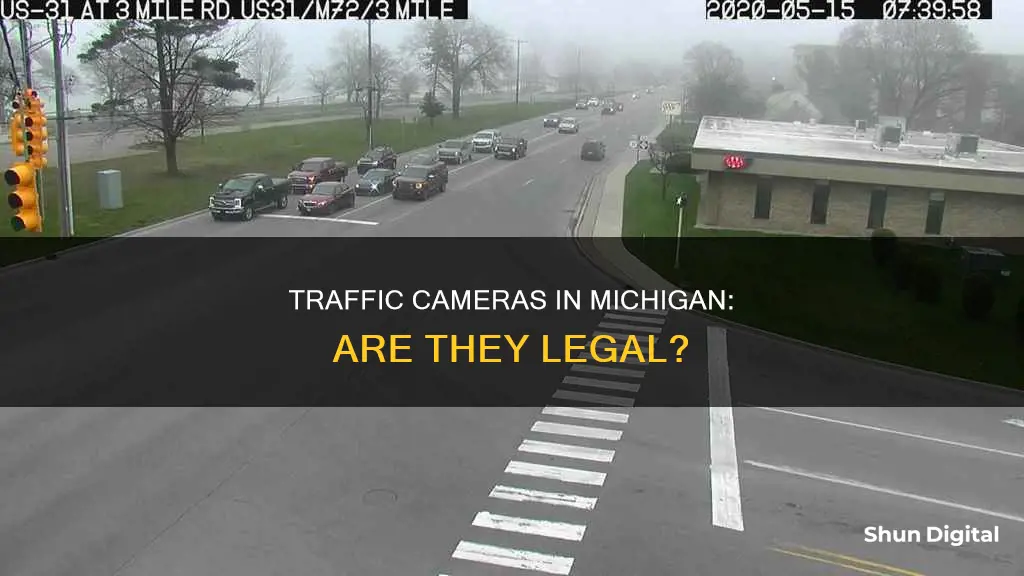
Michigan is currently considering a bill that would allow the use of traffic cameras in construction zones. The bill, known as House Bill 4132, has passed the state House but still needs to be approved by the state Senate and signed by the governor before becoming law. If enacted, the bill would allow the Michigan State Police and the state Department of Transportation to install cameras in work zones to automatically issue tickets to speeding drivers. While supporters of the bill argue that it will improve worker safety, critics argue that it is a money grab that will lead to more policing and unnecessary surveillance. The bill has sparked a debate over the legality and effectiveness of traffic cameras in Michigan, with some arguing that it is a necessary measure to improve road safety, while others raise concerns about privacy and drivers' rights.
| Characteristics | Values |
|---|---|
| Are traffic cameras legal in Michigan? | No, but there is proposed legislation that would allow their use in construction zones. |
| Are red-light cameras legal in Michigan? | No |
| Are there any traffic cameras in Michigan? | Yes, but only in intersections to control traffic flow. |
What You'll Learn

Michigan's House Bill 4132
Michigan has traditionally refrained from adopting camera ticketing, unlike its neighbouring states of Illinois and Ohio. However, this may be about to change with the introduction of House Bills 4132 and 4133, which propose the use of traffic cameras in construction zones. These bills, if passed, would amend Michigan law to permit the installation of cameras in construction areas where workers are present and where there is no physical barrier between workers and traffic.
The proposed legislation has gained significant traction and is close to becoming law. The bill's supporters cite safety concerns, particularly the fact that speeding is the leading cause of fatal work zone crashes. In 2023, there were 20 fatal crashes in Michigan's work zones. The bill's passage would mean that drivers caught speeding by these cameras would first receive a written warning, followed by increasing fines for repeat offences. All revenue from these fines would go towards a Work Zone Safety Fund, which would pay for the cameras, traffic control equipment, and an expanded police presence in work zones.
However, critics argue that the bill is not truly about worker safety, as the majority of the funds will be used to pay for the cameras themselves and existing traffic control equipment, rather than directly helping injured construction workers and their families. They also worry that the bill could set a dangerous precedent for the expansion of camera ticketing across the state, leading to increased surveillance and the erosion of civil liberties.
The debate surrounding Michigan House Bill 4132 highlights the complex balance between public safety, privacy, and individual liberties in the modern era. While the bill aims to address the serious issue of fatal work zone crashes, there are concerns about the potential for overreach and the impact on civil liberties if automated camera systems are widely implemented.
Mastering Camera Modes: A Guide to Shooting in Manual Mode
You may want to see also

Work Zone Safety Fund
Michigan has a rich legal history to uphold, and its new camera ticketing bill threatens to compromise its values. The state has always refrained from needless surveillance, but the new House Bill 4132, if signed into law, will establish speed cameras in construction work zones. This means drivers will be monitored at all times, regardless of whether there is reasonable suspicion of a violation.
The Work Zone Safety Fund will be established using revenue from the fines issued by the new speed cameras. However, this fund will not directly benefit injured construction workers or their families. Instead, the money will primarily pay for the cameras themselves, with additional revenue going towards traffic control equipment and expanding police presence in work zones. This allocation of funds has been criticized as unnecessary and misdirected, as the state of Michigan already has sufficient traffic control equipment, and the success of similar programs in other states suggests that an increased police presence may not be needed.
Work Zone Safety in Michigan
The Michigan Department of Transportation (MDOT) is committed to improving overall safety for all road users, including internal staff, contractors, emergency responders, and motorists. MDOT provides various resources and guidelines to enhance work zone safety and mobility, such as the Work Zone Safety and Mobility Manual, Maintenance Work Zone Traffic Control Guidelines, and the MMUTCD Part 6 - Temporary Traffic Control. MDOT also offers educational materials, such as videos, social media content, and publications, to raise awareness about work zone safety.
Work Zone Crash Statistics
In 2023, there were 8,017 work zone crashes in Michigan, resulting in 21 fatal crashes and 24 fatalities. Additionally, 1,896 people were injured in work zone crashes. Speeding and distracted driving are leading causes of these incidents, with most crashes occurring when lanes are closed or there is work on the shoulder or median. MDOT emphasizes the importance of obeying posted signs, slowing down, and staying alert in work zones to prevent accidents and save lives.
The Ultimate Guide to Caring for Your Camera Lenses
You may want to see also

Cameras vs. barriers
Michigan has historically been proud of its legal system, being the first English-speaking polity to abolish the death penalty and one of only ten states that don't allow sobriety checkpoints. However, this may change with the introduction of House Bills 4132 and 4133, which would allow the installation of traffic cameras in construction zones where there is no barrier between construction workers and traffic.
The use of traffic cameras to enforce traffic laws is highly controversial. While they can improve road safety, there are concerns about public safety, privacy, and drivers' rights. Proponents of traffic cameras argue that they can effectively reduce speeding and red-light running, leading to fewer accidents and injuries. On the other hand, opponents argue that they invade privacy and can be used for mass surveillance. Additionally, there is a concern that they may not always provide accurate readings, leading to unfair tickets.
In Michigan, the proposed camera ticketing bill has sparked debate. The bill would establish speed cameras in construction work zones to monitor drivers' speeds regardless of reasonable suspicion. While supporters cite the success of similar programs in reducing speeding in work zones, opponents argue that the revenue generated from fines should go towards helping injured construction workers and their families instead of paying for the cameras and expanding police presence.
One alternative to using traffic cameras is to implement physical barriers that separate construction workers from traffic. This can include concrete barriers, guardrails, or other types of physical separation. While barriers may not directly enforce speed limits, they can provide a visual and physical reminder to drivers to slow down and be cautious when approaching a construction zone. Additionally, barriers can help protect workers from potential collisions by creating a buffer zone.
However, there are also considerations to take into account when using physical barriers. They may not be feasible or practical in all construction zones, especially in areas with limited space or unique road configurations. Additionally, physical barriers can obstruct the view of drivers, potentially creating blind spots and hindering their ability to navigate safely.
In conclusion, the debate between cameras and barriers for traffic enforcement is complex. While traffic cameras can provide an automated and data-driven approach to enforcing speed limits and reducing accidents, they raise concerns about privacy and the potential for misuse. On the other hand, physical barriers offer a more passive approach but may have limitations in their effectiveness and applicability in certain situations. Ultimately, a combination of both strategies may be the most effective way to improve road safety and protect both drivers and construction workers.
Charging Kodack Z650 Camera Batteries: A Step-by-Step Guide
You may want to see also

Public safety and privacy concerns
Michigan has historically been proud of its restraint when it comes to the law and surveillance. However, in 2022, the state weighed the use of cameras to monitor and enforce speed limits in construction zones. This was in response to a rising number of fatal crashes and an expected increase in new road construction projects. The bill, HB 5750, would authorize an automated speed enforcement system in construction zones, replacing state troopers with cameras that could be mounted on unmarked vehicles. While proponents of the bill cite public safety and the need to change driver behaviour, critics argue that it is an invasion of privacy and a cash grab.
The bill has faced opposition from those who argue that it is an invasion of privacy and a potential profiling tool. Rep. Cambensy, who introduced the bill, acknowledged that the proposal is controversial and emphasised that it is narrowly focused on work zones with high traffic volumes and accident rates. The bill also states that the cameras would only photograph license plates and not the drivers themselves.
Privacy concerns have been raised about the potential for misuse of personal data collected by the cameras. Maryland, which implemented a similar program, was sued over privacy concerns. Other states, such as Texas, Arkansas, Mississippi, and Wisconsin, voted down similar proposals due to privacy worries.
Supporters of the bill argue that it is necessary for public safety, especially for construction workers. In 2022, there were 4,393 work zone crashes in Michigan, resulting in 16 fatalities and 862 injuries. By implementing the cameras, lawmakers aim to reduce speeding and dangerous driving in these areas.
The American Civil Liberties Union of Michigan (ACLU) opposed the bill, requesting more frequent and transparent reporting on the effectiveness of the program. They argued that a five-year period without reporting is too long for the monitoring program to operate without accountability.
The debate over the use of traffic cameras in Michigan highlights the tension between public safety and privacy concerns. While supporters argue that the cameras will improve safety in construction zones, critics worry about the potential for government overreach and the misuse of personal data. As the state weighs the benefits of the proposal, it remains to be seen whether the benefits of increased safety will outweigh the potential risks to privacy.
Ai Weiwei's Surveillance Camera Sculpture: Global Locations, One Message
You may want to see also

Automated vs. manual ticketing
In Michigan, House Bills 4132 and 4133 propose the use of traffic cameras in construction zones to monitor speeding. This has sparked a debate about the legality and ethics of such surveillance measures. While some argue that it is a much-needed safety measure, others worry about the potential for government overreach and unnecessary fines.
Automated Ticketing
With the proposed implementation of traffic cameras in Michigan, the state would join over 20 other states that use similar technology. Automated ticketing systems use AI and other automation tools to manage customer inquiries and provide fast and personalized support. These systems can open tickets with contextual information, automatically route them to the appropriate agent, and provide instant responses. One of the key benefits of automated ticketing is the increased speed of response and resolution, which can lead to higher customer satisfaction. Additionally, automation can free up human agents to focus on more complex or meaningful tasks, reducing burnout and increasing job satisfaction.
Manual Ticketing
On the other hand, manual ticketing relies on human agents to manage and resolve customer queries. In the context of traffic ticketing, this means that law enforcement officials are responsible for issuing tickets to drivers who violate traffic laws. This approach allows for empathy and personal discretion, as demonstrated in the example of a kind officer who gave a warning instead of a ticket to a speeding driver. Human agents can take into account individual circumstances and make decisions based on their personal experiences and capacity for empathy.
Both automated and manual ticketing systems have their advantages and disadvantages. Automated ticketing can provide faster responses and free up resources, but it may also be seen as a form of unnecessary surveillance. Manual ticketing allows for human connection and discretion, but it can be time-consuming and subject to individual biases. Ultimately, the decision to implement automated traffic ticketing in Michigan should consider the balance between efficiency and the potential intrusion on civil liberties.
Privacy Protection: Taping Your Computer Camera
You may want to see also
Frequently asked questions
Traffic cameras are not yet legal in Michigan. However, the Michigan House passed a bill to allow them, but it hasn't been passed by the Senate yet.
House Bill 4132, which passed 67-42, would allow the Michigan State Police and the state Department of Transportation to use cameras in work zones.
First-time offenders would get a written warning. Second and third-time offenders could be fined up to $150 or $300.
The bill's proponents argue that it is about workers' safety. In 2022, there were 4,393 work zone crashes in Michigan that resulted in 16 fatalities and 862 injuries.
Critics argue that the bill is a cash grab and that cameras are not an effective solution for improving safety in work zones. They suggest that building barriers to protect workers and improving public transportation are better solutions.


